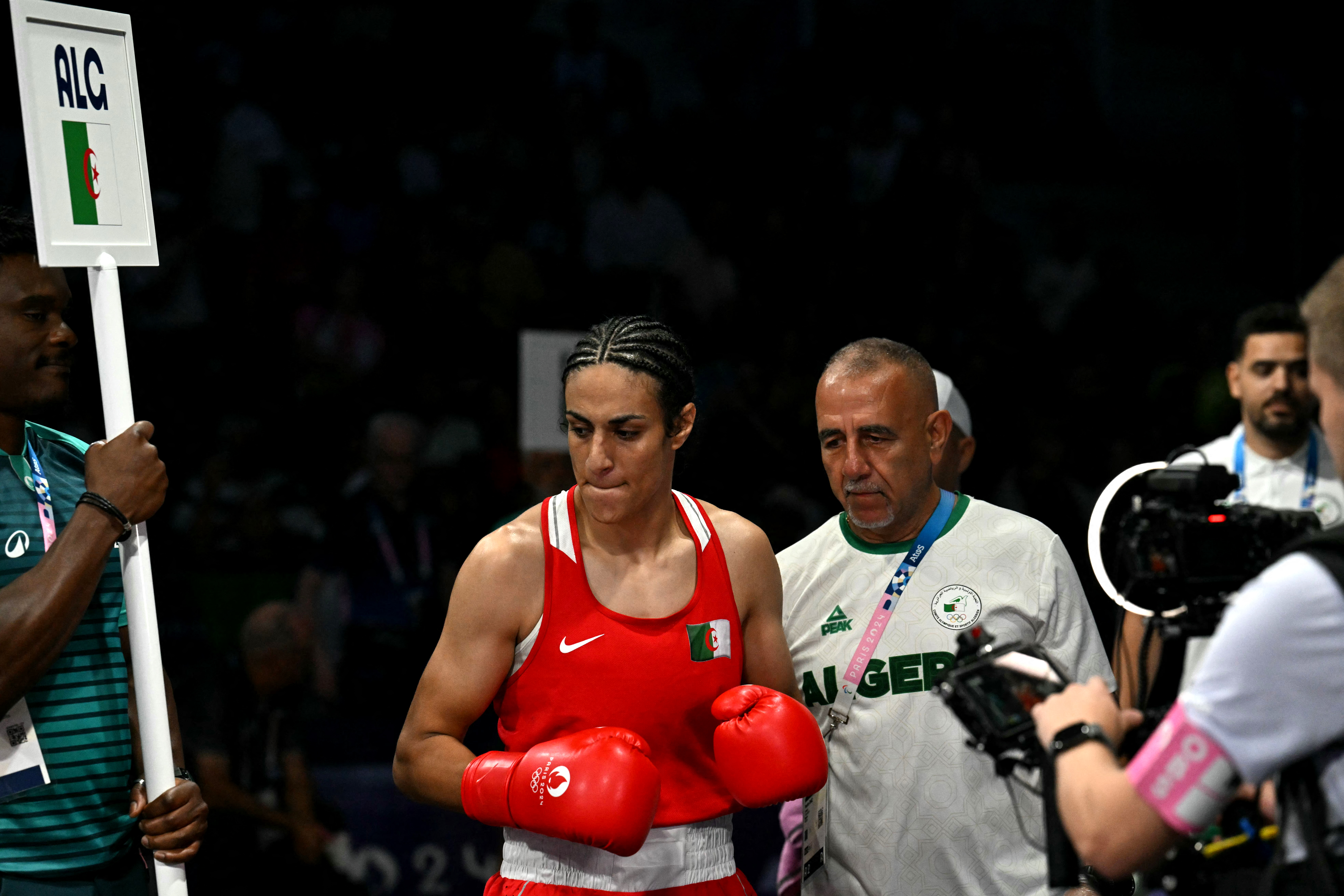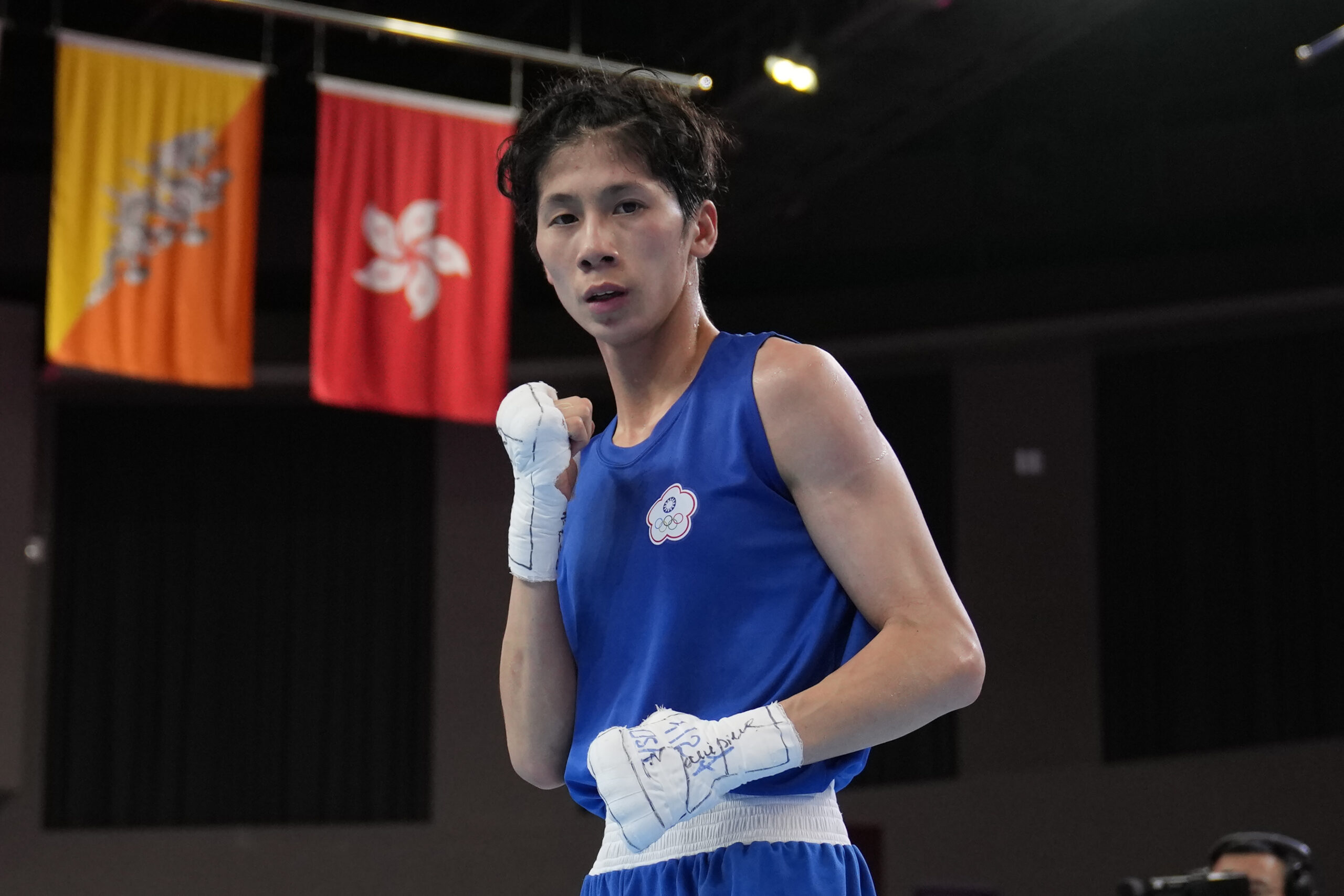As gender row engulfs Paris Olympics boxing, what is testosterone?

Algeria’s Imane Khelif (C) arrives for her women’s 66kg preliminaries round of 16 boxing match against Italy’s Angela Carini during the Paris Olympics 2024 at the North Paris Arena, in Villepinte on August 1, 2024. (Photo by MOHD RASFAN / AFP)
Algerian boxer Imane Khelif’s swift defeat of her Italian opponent at the Paris Olympics on Thursday has sparked a row after she was disqualified from a previous competition over reportedly high levels of testosterone.
Figures such as far-right Italian Prime Minister Giorgia Meloni quickly condemned that Khelif was allowed to compete at the Summer Games.
READ: Imane Khelif, boxer in gender test issue, wins first Paris Olympics fight
As the controversy threatened to overshadow the sixth day of the Olympics, here are some facts about testosterone.
What is testosterone?
Testosterone is a sex hormone produced by both men and women. However, men produce up to 20 times more testosterone — primarily in the testicles.
Women make far less, in the ovaries and adrenal glands.
A normal level of testosterone for men is estimated to be 10 to 35 nanomoles per liter in blood, according to the US Mount Sinai hospital.
READ: At Paris Olympics, female designation in passport key for boxersFor women, it is between 0.5 to 2.4 nmol per liter.
Testosterone levels can also vary widely by age and time of year.
When people naturally produce an excess of sex hormones such as testosterone, it is called hyperandrogenism.
The condition affects an estimated five percent of women, with around 70 percent of cases caused by polycystic ovary syndrome, research has found.
Symptoms include acne, body hair growth and scalp hair loss.
How does this affect sport?
Testosterone can promote bone and muscle mass — deliberately boosting levels is a common form of doping and is banned.
Research has suggested that people with an excess of testosterone are over-represented in elite sport.
But just how much the hormone boosts performance remains a matter of debate.
READ: IOC backs boxers at Paris Olympics who failed gender testsThe International Olympic Committee’s head of human rights Magali Martowicz said in 2021 that there no was no “scientific consensus” on how testosterone affects athletic performance.
At the 2021 Tokyo Olympics, New Zealand weightlifter Laurel Hubbard became the first openly transgender woman to take part in an Olympic event.
To qualify, she had to keep her testosterone levels below 10 nmol per liter for at least 12 months.
In spite of meeting the requirements, Hubbard’s participation was widely criticized.
At the end of 2021, the IOC gave up on establishing uniform guidelines for this kind of participation criteria, leaving it to the separate international sport federations.
What about the boxers?

FILE – Taiwan’s Lin Yu-ting poses after winning against India’s Parveen in the Boxing Women’s 54-57Kg Semifinal bout during the 19th Asian Games in Hangzhou, China, Wednesday, Oct. 4, 2023. (AP Photo/Aijaz Rahi, File)
Khelif was disqualified during the boxing world championships last year after “elevated levels of testosterone failed to meet the eligibility criteria,” according to the IOC’s website.
Khelif and boxer Taiwan’s Lin Yu-ting were both disqualified from the New Delhi event by the International Boxing Association (IBA) under Russian oligarch Umar Kremlev.
However, because of governance, financial and ethical issues at the IBA, it was effectively expelled from the Olympic movement last year. The IOC has taken responsibility for organizing the boxing at the Paris Games.
In a statement on Wednesday, the IBA said the two boxers “did not undergo a testosterone examination but were subject to a separate and recognized test, whereby the specifics remain confidential”.
IOC spokesman Mark Adams said everyone taking part in the women’s event was “complying with competition eligibility rules”.
“These athletes have competed many times before for many years, they haven’t just arrived, they competed in Tokyo,” he said.
“Testosterone is not a perfect test. Many women can have testosterone which is in what would be called ‘male levels’ and still be women, still compete as women,” he said.
“This idea that suddenly you do one test for testosterone and that sorts everything out — not the case, I’m afraid,” he added.
“I hope we’re all agreed that we’re not calling for people to go back to the bad old days of sex testing, which was a terrible thing to do.”
Follow Inquirer Sports’ special coverage of the Paris Olympics 2024.